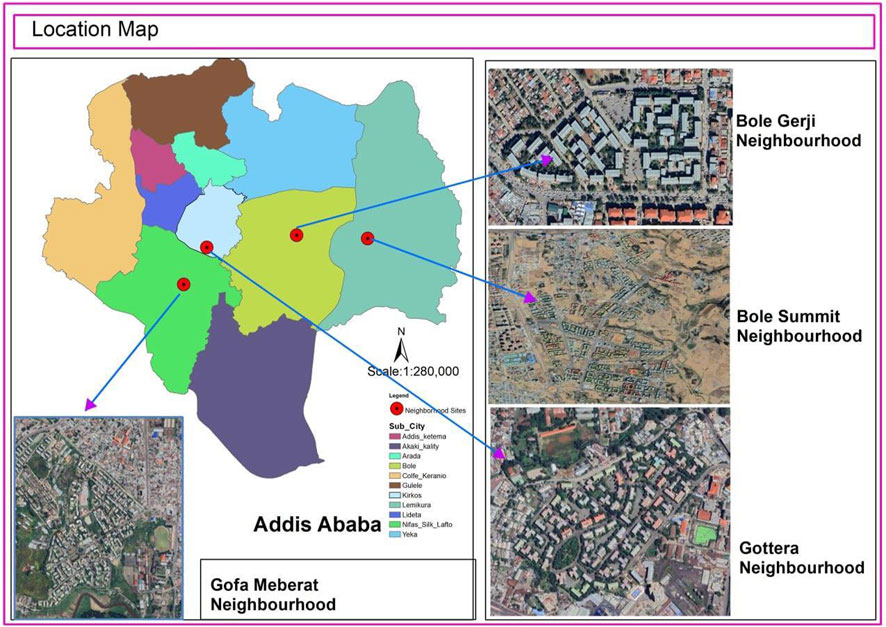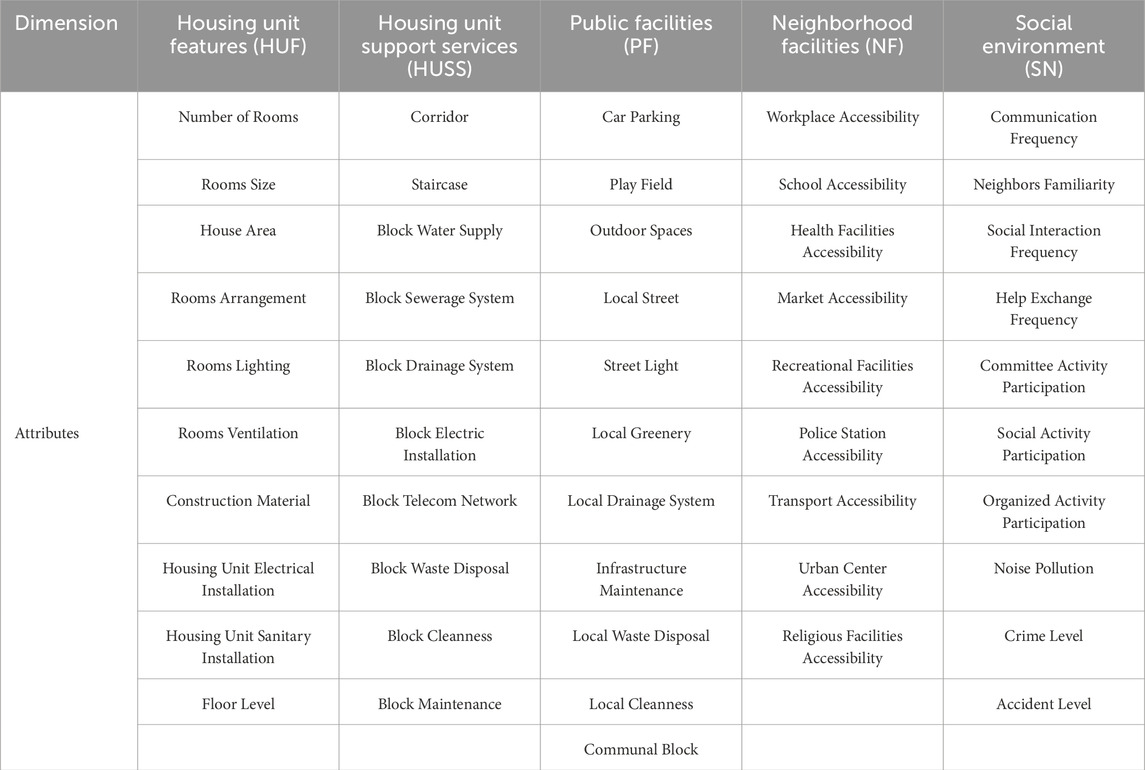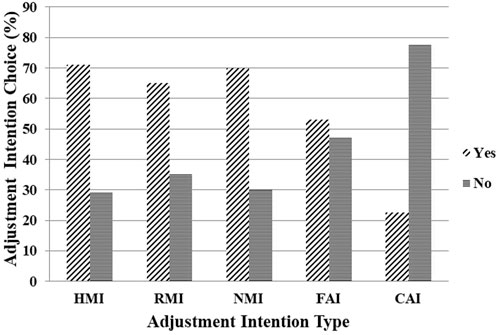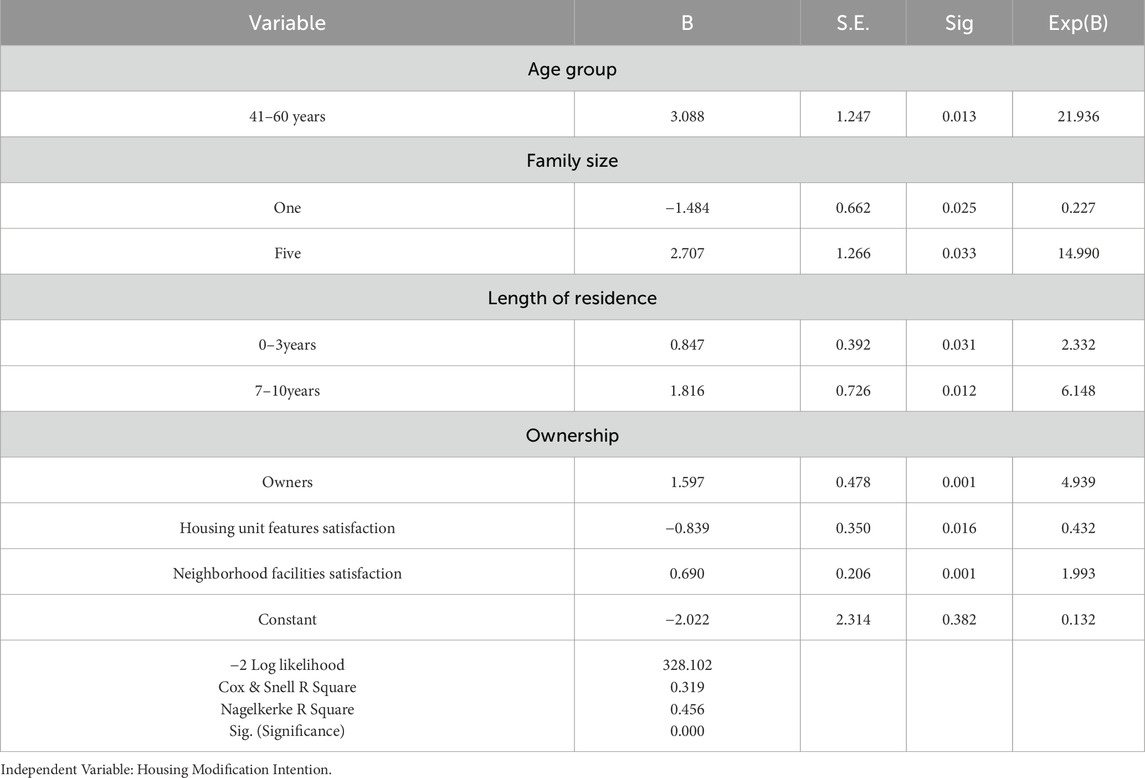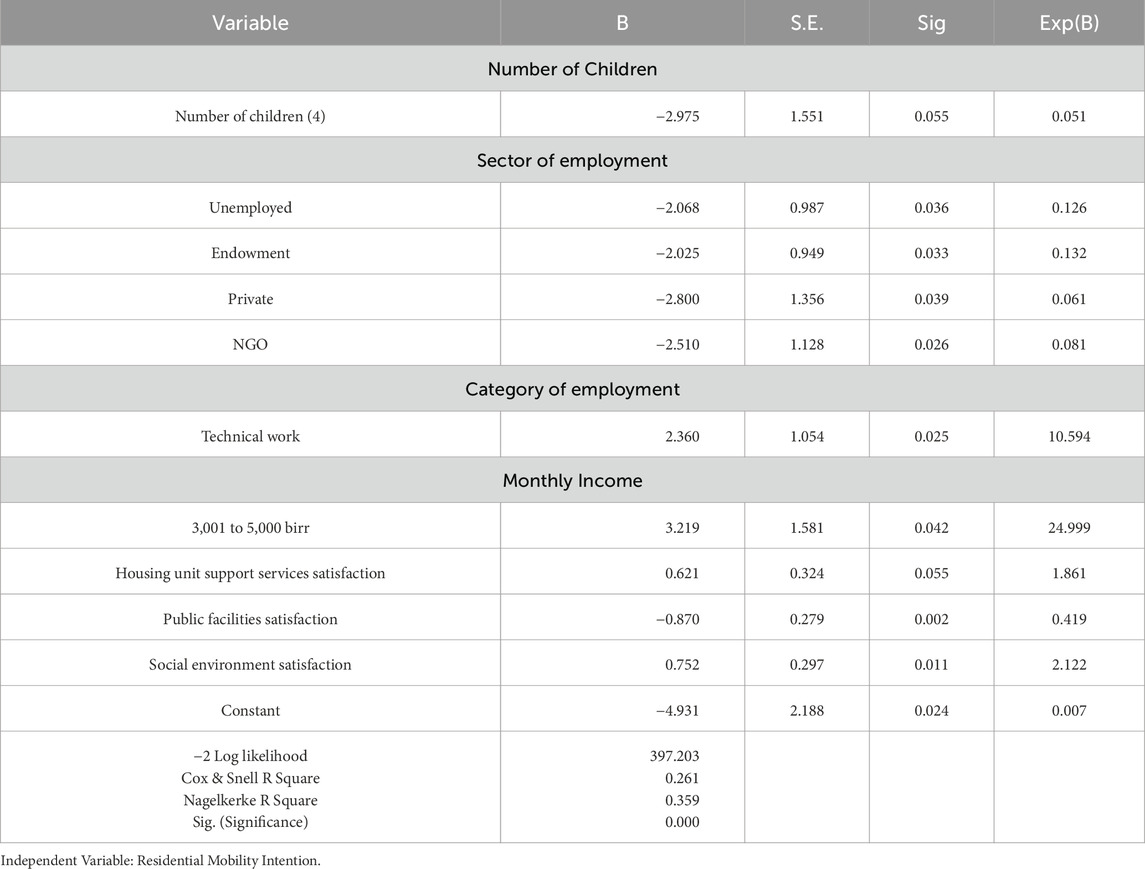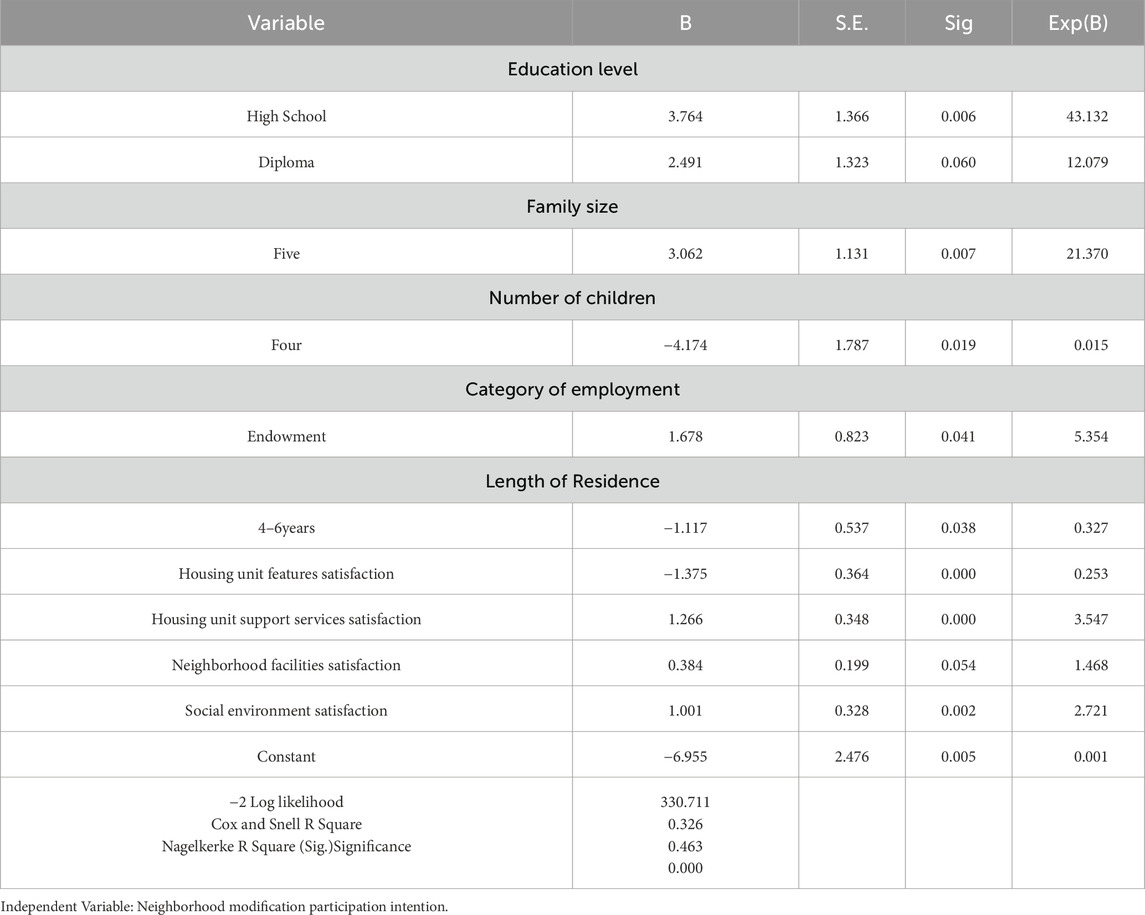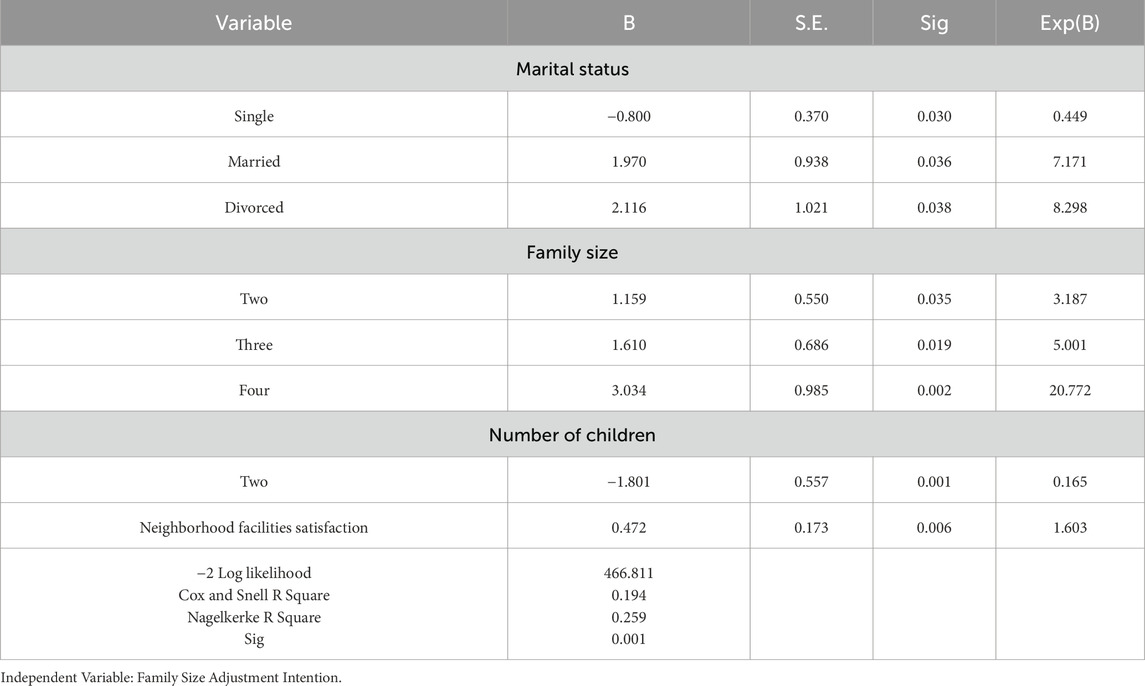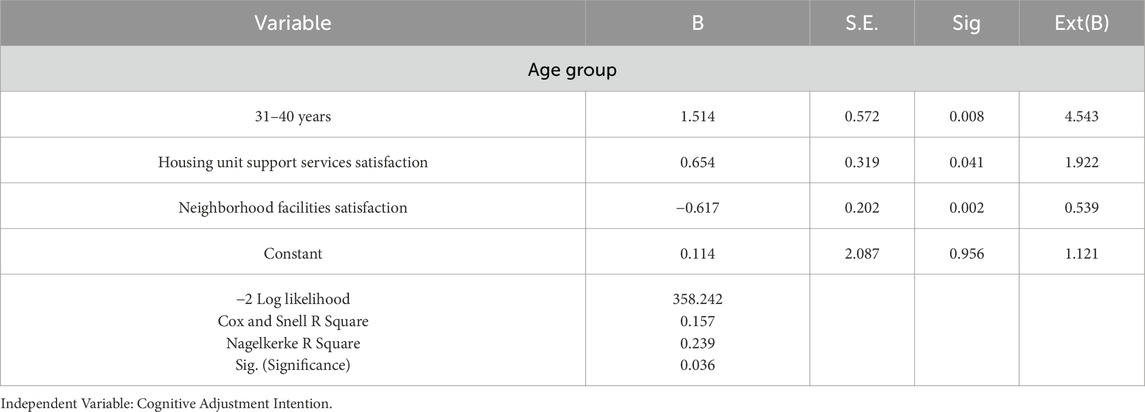- 1Department of Housing and Real Property Valuation, College of Urban Development and Engineering (CUDE), Ethiopian Civil Service University, Addis Ababa, Ethiopia
- 2Department of Urban and Regional Planning, Ethiopian Institute of Architecture, Building Construction and City Development (EiABC), Addis Ababa University, Addis Ababa, Ethiopia
Although families often evaluate and modify their housing to meet evolving needs, leading to decline or improvement of neighborhoods, comprehensive studies on residential adjustment intentions remain scarce, particularly in Ethiopia. This study explores determinants of residential adjustment intentions among low-cost condominium residents in Addis Ababa. Using stratified random sampling, 400 households were randomly sampled from inner, intermediate, and outskirt neighborhoods and data were analyzed using descriptive statistics and binomial logistic regression. The study operationalized residential adjustment intentions as dichotomous while residential dimensions satisfaction as ordinal variable with a five-point Likert scale. Results indicate that physical adjustment intentions, like housing modifications and neighborhood improvement participation followed by residential mobility, are the most common, while non-physical adjustment intentions, family size and cognitive adjustments are less frequent. Socio-demographic factors, including age, marriage, family size, number of children, education level, employment type, ownership, and residence duration, influence adjustment intentions, reflecting the impact of life course dynamics. Residential satisfaction is a crucial factor, where satisfaction with neighborhood facilities encourages physical and family size adjustments, satisfaction with public facilities reduces the likelihood of relocation but promote cognitive adjustment, and dissatisfaction with housing characteristics promotes housing unit modifications. These findings underscore the importance of developing housing policies and planning strategies as per the various dimensions of residential satisfaction and adjustment intentions of residents. The study also implies tailored planning interventions to address the unique needs of different groups. Furthermore, the research calls for longitudinal and cross-cultural studies to strengthen its generalizability and practicality of evidence-based interventions.
1 Introduction
Global housing shortages, exacerbated by rapid urbanization, necessitate the annual construction of approximately 28.25 million new housing units (UN-HABITAT, 2023). To address these pressing needs, some countries have initiated various schemes of low-cost housing like Ganga Warrier et al. (2019) discussed low-cost housing scheme in India; Ghasemih and Ozay (2018) discussed affordable housing provision in Iran; Ulusoy et al. (2012) discussed mass housing scheme in Turkey; Wang and Murie (2011) discussed affordable and social housing provision system in China. Similarly, Addis Ababa, Ethiopia’s capital faces a similar challenge, with its growing population intensifying the demand for affordable housing. In response, low-cost condominium housing program targeting low- and middle-income groups has been implemented since 2005 (UN-HABITAT and Rollnik, 2010). While the program has contributed a lot to address quantitative housing shortages, it has not sufficiently met the qualitative needs of residents (Charitonidou, 2022; Delz, 2016). According to Priemus (1986) such a mismatch between housing conditions and resident needs diminishes satisfaction, potentially leading to stress. When this dissatisfaction stress surpasses a certain threshold, households may consider housing adjustment options (Morris and Winter 1975).
Residential adjustment intention refers to the desire to change one’s living situation and is typically influenced by residential satisfaction levels (Fattah et al., 2021; Maina and Mohammed, 2021; Obi et al., 2023). According to Rossi’s (1955) Life Course, Morris and Winter (1975) Family Housing Adjustment theory and Speare’s (1974) seminal work, residential adjustment can take various forms, including physical modifications to the dwelling, relocation, changes in family size and adaptation with existing condition. There are considerable studies employed these theory but the majority focus on residential mobility. For example, Aliu (2019), Clark and Lisowski (2016) and Courter and Scott (2015) employed life course theory to investigate dynamics of intra-urban residential mobility in Nigeria, Australia and Great Britain, respectively, and found that family life course, socio-demographic factors and levels of residential satisfaction were significant predictors of residential mobility. Moreover, Willibald et al. (2018) utilized family house adjustment framework to evaluate the reasons for people’s residential mobility and found that housing space deficient and the subsequent conflict are among the reasons for moving. There is also considerable empirical research on the determinants of different forms of residential adjustment, such as residential mobility adjustment (Afolabia et al., 2024; Fattah et al., 2021; Maleszyk and Kędra, 2020), housing modification adjustment (Latifa and Fatiha, 2024; Maina, 2023; Morakinyo, 2021), and cognitive or behavioral adjustment (Obi et al., 2023; Okunola and Bako, 2021; Warakapitiya et al., 2024). However, most research has primarily focused on residential mobility and one form of residential adjustment independently, leaving other forms of residential adjustment and their determinants underexplored. Moreover, findings across studies have shown inconsistencies, with household characteristics influencing residential adjustments in varying ways. These discrepancies underline the need for context-specific studies. Moreover, numerous studies on low-cost condominium housing in local contexts primarily focus on provision, satisfaction, and affordability (Delz, 2016; Hemen, 2020; Sunikka-Blank et al., 2021; Tiumelissan and Pankhurst, 2016; Workineh, 2022). However, to the best of our knowledge, no similar research has been conducted within the context of Ethiopia. This study aims to fill this gap by examining the forms and determinants of residential adjustment intentions among residents of low-cost condominium housing in Addis Ababa, with a particular focus on residential satisfaction as a key determinant.
Understanding the factors that drive residential adjustments is essential for effective housing policy and planning. For instance, residential mobility can lead to the outmigration of higher-income residents, resulting in the concentration of lower-income households and accelerating neighborhood decline (Andersen, 2003). Cognitive adjustments, such as neglecting maintenance, can exacerbate this decline, while housing improvements and balanced mobility can enhance neighborhood conditions (Clark and Maas, 2013; Land and Doff, 2010; Seek, 1983). By identifying the factors driving residential adjustment intentions, this study will provide valuable insights to policymakers, urban planners, and designers, enabling the development of targeted interventions.
This paper is structured as follows: first, a review of the forms and determinants of residential adjustment, followed by a detailed description of the study’s methodology. The results are then presented, followed by a discussion and conclusion.
2 Literature review
2.1 Residential adjustment and its determinants
Residential adjustment intention refers to a household’s propensity to modify their current living condition or environment to meet changing housing needs (Priemus, 1986). Residential adjustment can be categorized into five distinct forms. The first two are non-physical adjustments: (1) Cognitive adjustment, where households adapt their needs to align with current housing conditions, and (2) Family size adjustment, involving compositional or organizational changes within the household to suit the existing housing situation. The remaining three forms involve physical alterations; (3) Residential mobility, specifically confined to relocation within the same urban area; (4) Housing modification adjustment, where physical alterations are made to improve the suitability of the dwelling; and (5) Neighborhood modification participation adjustment, which entails active involvement in neighborhood-level physical changes to enhance housing suitability (Morris and Winter 1975; Priemus, 1986; Rossi, 1955). Unlike most residential or housing adjustment studies, this study deals with all the above forms of residential adjustment intentions.
A great deal of research has been conducted on residential adjustment, drawing on two key theories: Life Course and Family Housing Adjustment. According to Morris and Winter’s (1975) family housing adjustment theory, families engage in an ongoing process of evaluating their housing environment’s quality and adequacy against established cultural and familial norms. Discrepancies between the actual and preferred housing conditions, as defined by these norms, result in dissatisfaction. When the deviation becomes significant enough to generate substantial housing dissatisfaction, families are most likely to consider various forms of residential adjustment like residential mobility, residential modification, and family size adjustment. Residential satisfaction, which ones level of confinement with one’s residential environment, is seen as driver of residential adjustment in this theory.
However, Rossi’s (1955) Life course theory focuses on how families adjust their housing in response to changing needs over time. It suggests that family decisions regarding housing, such as moving or modifying their home, are influenced by factors like family size, composition, and economic conditions. The theory posits that as families progress through different life stages, their housing preferences and requirements evolve, requiring adjustments to meet new needs. Socio-demographic and economic aspects of households are seen as drivers of residential adjustment in this theory. The preceding review of these theories suggests that socio-demographic factors and residential satisfaction play a significant role in influencing various forms of residential adjustment. This study investigates the determinants of residential adjustment intentions through the lens of the aforementioned theories.
Multiple studies have explored determinants of residential adjustment based on Life Course and Family Housing Adjustment theory. Some of these studies suggest that socio-demographic and economic aspects of households are driver of residential adjustment. For example, studies have consistently demonstrated that residential mobility decreases as age increases (Afolabia et al., 2024; Aliu, 2019; Barreira et al., 2019; Clark and Lisowski, 2016; Jiang et al., 2019). Similarly, most studies have found that older households are more likely to undertake housing modifications or improvements (Ahmad et al., 2000; Bravo et al., 2019; Cirman et al., 2013; Lee, 2000; Sinai, 2001). However, Plaut & Plaut (2010) found that young households are more likely to undertake housing modifications.
The association between marital status and residential adjustment has been extensively studied. Most studies found that marital status plays a significant positive role in residential mobility, particularly through events like marriage, family formation, and union dissolution (Aliu, 2019; Clark and Lisowski, 2017; Jiang et al., 2019; Maleszyk and Kędra, 2020; Pagani et al., 2021; Spackova et al., 2016; Willibald et al., 2018). Likewise, married household heads are more likely to engage in housing improvement (Sinai, 2001). However, Yu et al. (2023) found that unmarried low-income residents are significantly more likely to move than married residents.
The other determinant of residential adjustment that has been widely discussed in the literature is income. High income households are found to be more mobile in many studies (Afolabia et al., 2024; Aliu, 2019; Clark and Lisowski, 2017; Diaz-Serrano and Stoyanova, 2010; Pagani et al., 2021). Similarly, high income positively affects home improvement (Avogo et al., 2017; Bravo et al., 2019; Kularatne et al., 2019; Latifa and Fatiha, 2024; Maina and Mohammed, 2021). Likewise, Kirtania et al. (2022) found that family income is a significant positive predictor for cognitive adjustment among higher secondary students. Nevertheless, Morakinyo (2021) found that higher income levels were associated with a lower likelihood of dwelling modification and Willibald et al. (2018) discovered that low income families are more mobile than high income ones due to affordability issues.
Residential adjustment is also influenced by factors such as homeownership status and the duration of residence. Most studies consistently have showed that ownership generally reduced residential mobility compared to renting (Aliu, 2019; Clark and Lisowski, 2017; Fattah et al., 2015; Pagani et al., 2021; Spackova et al., 2016). Nevertheless, Jiang et al. (2019) found that renters exhibited lower intentions to move. Moreover, most studies consistently have found that homeowners were significantly more likely to improve or modify their housing than renters (Ahmad et al., 2000; Avogo et al., 2017; Bravo et al., 2019; Culp, 2011; Kularatne et al., 2019; Sinai, 2001). Similarly, several studies have demonstrated that the likelihood of relocation diminished with an increase in the duration of residence (Afolabia et al., 2024; Basolo and Yerena, 2016; Clark and Lisowski, 2017; Diaz-Serrano and Stoyanova, 2010; Spackova et al., 2016). Likewise, some studies indicated that a longer duration of residence was positively associated with the likelihood of renovations (Ahmad et al., 2000; Bravo et al., 2019; Sinai, 2001).
The association between household size and residential adjustment is context-dependent. Larger households frequently exhibit reduced mobility due to logistical and financial constraints (Afolabia et al., 2024; Clark and Lisowski, 2017). However, in situations where space becomes inadequate, increased household size can act as a catalyst for mobility (Aliu, 2019; Pagani et al., 2021; Willibald et al., 2018). Furthermore, numerous studies consistently have showed that household size increase generally triggered housing modification (Kularatne et al., 2019; Latifa and Fatiha, 2024; Maina, 2023; Umeh and Ezeji, 2023). Nonetheless, Morakinyo (2021) found that households with more than four members are less likely to personalize dwellings compared to smaller households.
The number of children in a household also has a notable influence on residential adjustment in various contexts. Families that experience growth due to the addition of children are more inclined to move in order to meet spatial requirements and enhance living conditions (Aliu, 2019; Spackova et al., 2016; Willibald et al., 2018). However, Clark & Lisowski (2017) observed that couples with children tend to be less likely to relocate, as the family structure often serves to anchor them to their current residence. Similarly, the presence of children, especially in relation to household size, appears to be a substantial factor in the decision to modify or improve housing (Kularatne et al., 2019; Latifa and Fatiha, 2024; Maina, 2023). On the other hand, Morakinyo (2021) discovered that as the number of children in a family increased, the likelihood of personalizing their dwellings decreased.
Several studies have indicated that gender does not significantly influence residential adjustment (Aliu, 2019; Barreira et al., 2019; Clark and Lisowski, 2017; Maleszyk and Kędra, 2020). However, Yu et al. (2023) found that males were more likely to relocate compared to females, whereas Morakinyo (2021) and Schwanitz et al. (2021) observed that females were significantly more likely to engage in housing personalization and residential mobility, respectively. Similarly, the impact of education level and employment type on residential adjustment found to vary across studies. Aliu (2019) and Clark and Lisowski (2017) found that higher education increased mobility. Likewise, Diaz-Serrano & Stoyanova (2010) found that job mobility increased likelihood to move while Barreira et al. (2019) found that higher employment status negatively correlated with residential mobility. However, Avogo et al. (2017), Bravo et al. (2019) and Plaut and Plaut (2010) found that households with higher education levels are more inclined to renovate while Morakinyo (2021) found that as education level increases, the likelihood of personalization decreases.
Residential satisfaction impact on residential adjustment varies over housing dimensions. Numerous studies consistently found that dissatisfaction with housing unit features, housing unit support services, public facilities, neighborhood facilities, and social environment increased residential mobility (Aliu, 2019; Barreira et al., 2019; Basolo and Yerena, 2016; Diaz-Serrano and Stoyanova, 2010; Fattah et al., 2015; 2021; Jahanshahloo and Daroudi, 2015; Jiang et al., 2019; Maleszyk and Kędra, 2020; Nasrollahzadeh et al., 2021; Pagani et al., 2021; Spackova et al., 2016; Willibald et al., 2018). Several studies also found that dissatisfaction with housing unit features increased the likelihood of modification (Carrasco et al., 2017; Lee, 2000; Maina, 2023; Umeh and Ezeji, 2023). However, Cirman et al. (2013) found that social environment satisfaction significantly increased the likelihood of housing modification. Moreover, housing unit features, housing unit support services, public facilities, neighborhood facilities, and social environment satisfaction had positive impact on behavioral or cognitive adjustment (Obi et al., 2023; Rahim and Hashim, 2018; Warakapitiya et al., 2024).
The foregoing review of theories and empirical studies on residential adjustment reveals that residential satisfaction and socio-demographic factors influence adjustment levels and forms, but their impacts vary by context, highlighting the need for case-specific and comprehensive investigations to inform housing policies and planning efforts. Moreover, most the empirical studies have focused on residential mobility or housing improvement adjustment forms independently, overlooking comprehensive assessments of multiple forms of residential adjustment. This research aims to address these gaps by exploring the determinants and multiple forms of residential adjustment in Addis Ababa’s low-cost condominium housing.
2.2 Conceptual framework
The study’s conceptual framework is grounded in Morris and Winter’s (1975) Family Housing Adjustment Theory, Rossi’s (1955) Life Course Theory, and findings from the foregoing review of empirical studies. The Family Housing Adjustment Theory asserts that dissatisfaction with one’s housing leads to intentions for residential adjustment, which may ultimately result in actual changes. Conversely, the Life Course Theory emphasizes that life cycle factors, including socio-demographic characteristics, drive residential adjustment. Empirical studies on residential adjustment have highlighted the role of both residential satisfaction and socio-demographic factors in shaping the levels and types of residential adjustments. In alignment with these theories, the conceptual framework of this study (illustrated in Figure 1) categorizes Residential Adjustment Intentions—such as Housing Modification, Residential Mobility, Neighborhood Modification Participation, Family Size, and Cognitive Adjustment—as dependent variables. Meanwhile, the independent variables consist of dimensions of residential satisfaction (such as Housing Unit Features, Housing Unit Support Services, Public Services, Neighborhood Facilities, and Social Environment Satisfaction) and socio-demographic characteristics of households.
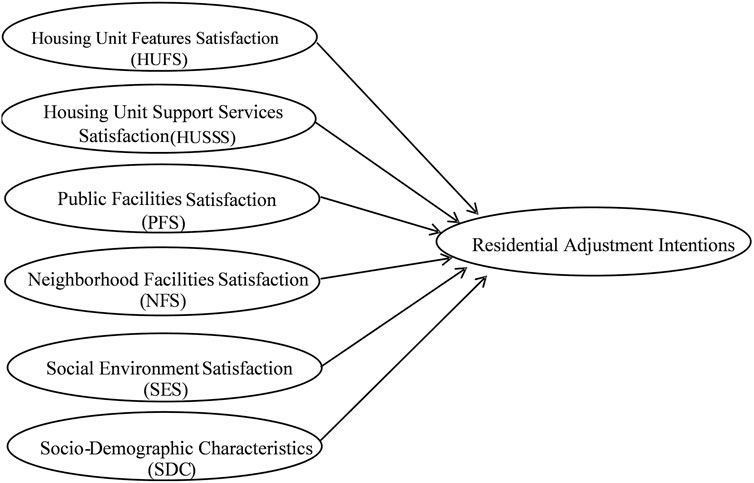
Figure 1. Conceptual framework of the study based on Morris and Winter’s (1975) and Rossi’s (1955) Theory.
3 Materials and methods
3.1 Study areas
Ethiopia, the second most populous country in Africa, has experienced rapid urbanization, particularly in its capital, Addis Ababa, which has put immense pressure on the city’s housing supply. To address the housing shortfall, the government launched the Integrated Housing Development Program (IHDP) in 2005, a low-cost condominium initiative aimed at alleviating the housing deficit, successfully providing thousands of housing units in the city (JTZ, 2005). To the best of the authors’ knowledge, no research has been conducted on residential adjustment activities in IHDP neighborhoods so far. This study focuses on four low-cost condominium housing neighborhoods as shown in Figure 2: Gottera, Gofa Mebrat, Bole Gerji, and Bole Summit. Gottera, located in the core of Addis Ababa, contains 2,433 units and operationalized in 2009 (Tigist, 2015). Gofa Mebrat, also in the inner city, includes 5,580 units and became functional in 2009 (Yonas, 2016). Bole Gerji, situated in the intermediate part of the city, contains 696 and transferred in 2006 (Samuel, 2017). Bole Summit, on the outskirts, contains 10,001 units and operational since 2014 (Hemen, 2020).
3.2 Methodology
This study employed stratified random sampling to select respondents, specifically household heads from low-cost condominium housing units. The population was categorized into three strata based on geographical location: inner, intermediate, and outskirts neighborhoods. Given the large number of inner-city neighborhoods, Gottera and Gofa Meberat were randomly sampled to represent this stratum. Bole Gerji and Bole Summit were similarly chosen for the intermediate and outskirts areas, respectively. These neighborhoods are sampled taking into consideration variability of time period, neighborhood location and size to get a better representative sample in context, time and space horizon. The number of respondents from each neighborhood was determined proportional to its population size.
Although Yamane’s (1967) formula calculated a sample size of 391, a total of 400 household heads sample size was determined by considering response rate expectations, population heterogeneity, and logistical feasibility, ensuring robust and reliable findings. The field survey, conducted continuously over 4 weeks starting in August 2023, achieved a remarkable 100% response rate. This success was attributed to thorough training of data collectors and the use of interviewer-administered questionnaires, which minimized non-response bias.
The questionnaire consisted of seven sections. The first section focused on the social, economic, and demographic characteristics of households. Sections two to six assessed satisfaction levels regarding various housing dimensions selected based on a literature review (Table 1). Respondents rated their satisfaction using a five-point Likert scale, ranging from 1 (very dissatisfied) to 5 (very satisfied).
Additionally, housing adjustment were evaluated using a binomial scale (0 = yes, 1 = no). Mean values for each attribute were computed to derive satisfaction levels for each housing dimension. Cronbach’s alpha was used to assess internal reliability, yielding values between 0.79 and 0.95, which indicate strong reliability. Data analysis was performed using SPSS (version 25), employing percentage distributions and binomial logistic regression.
3.3 Models
Five models were proposed to study the effect of housing dimensions satisfaction and socio demographic characteristics on five types of housing adjustment intentions. They are denoted by Equation 1–5, where
4 Results
4.1 Socio-demographic profile of respondents
The socio-demographic profile of the respondents, as summarized in Supplementary Appendix Table A1, reveals a balanced gender distribution (49.5% female, 50.5% male). The majority (40.0%) were aged 31–40 years, with 30.0% in the 18–30 range, 28.25% between 41–60 years, and 1.75% over 60 years. Most respondents were married (56.0%), with 35.25% single, and smaller proportions divorced (3.0%), widowed (2.5%), or in union (3.25%). Educationally, 51.0% held a degree, 13.75% had a diploma and 13.25% possessed post-graduate qualifications. Family size showed 22.5% with four members and 21.0% living alone. A significant portion (33.0%) had no children, while 27.75% had one, and 26.25% had two. Regarding employment, 58.75% worked in the private sector, 21.5% in government, and 11.75% were unemployed. The largest occupational group (32.0%) was engaged in business work, followed by office work (27.25%) and service work (20.25%). Most respondents (41.75%) had lived in their current residence for 4–6 years, with 53.0% residing in Summit, 29.75% in Gofa, 13.25% in Gottera, and 4.0% in Gerji. Housing tenure revealed 67.0% were renters. Family income showed that 63.75% earned over 11,000 birr. These diverse socio-demographic characteristics provide a comprehensive foundation for further study analysis.
4.2 Residential adjustment intentions choice
Descriptive analysis was undertaken to identify the dominant residential adjustment forms. The findings revealed diverse adjustment intentions among residents, with the highest percentages observed residential mobility in housing modification (71%), neighborhood modification participation (70%), and (65%) as shown in Figure 3. However just over half of the residents (53%) reported an intention to adjust their family size and only 22.5% of residents expressed cognitive adjustment intentions, indicating a low perceived need for altering their family size and mind-set.
4.3 Logistic regression analysis of housing adjustment intentions
Five logistic regression models were analysed to identify determinates of housing adjustment intentions. The first model is a logistic regression analysis of housing modification intention which resulted in p-value <0.001 and explained only 45.6% of the variance in intention to modify housing as shown in Table 2. While the analysis provides useful insight, the model’s variance is not high, indicating a limitation of the model that could be improved in future studies by incorporating more data.
The regression analysis on housing modification intention revealed several factors with p-value <0.05. Dissatisfaction with housing unit features was associated with a 56.8% increase in the likelihood of housing modification. Conversely, higher satisfaction with neighborhood facilities increased the likelihood of housing modification by 99.3%. Moreover, middle-aged individuals (41–60 years) were found to be 21.94 times more likely to express housing modification intentions compared to younger residents. Additionally, larger households were 14.99 times more likely to undertake housing modifications than single family. In contrast, single families exhibited lower likelihoods of modification. Residents with longer lengths of residence, particularly those residing between 7 and 10 years, were 6.15 times more likely to modify their housing.
The second model is a logistic regression analysis of residential mobility intention. This logistic regression model resulted in p-value <0.001 and explained only 35.9% of the variance in the residential mobility intention as shown in Table 3. Though the analysis provides useful insight, the variance explained by the model is not high, indicating the limitation of the model that could be improved in future studies by incorporating more data. The regression analysis indicates that a higher level of satisfaction with public facilities reduces the likelihood of moving by approximately 58%. On the other hand, greater satisfaction with housing unit support services though this result is marginally significant and social environment increases the likelihood of moving, with the odds of moving increasing by 86% for housing unit services and 112% for social environment satisfaction. Families with four children are 95% less likely to move compared to other family sizes, although this result is marginally significant. Furthermore, unemployed residents, those working in the endowment sector, the private sector, and NGOs are all less likely to move, with the likelihood of moving decreasing by 87%, 87%, 94%, and 92% respectively. Furthermore, unemployed residents, those working in the endowment sector, the private sector, and NGOs are all less likely to move, with the likelihood of moving decreasing by 87%, 87%, 94%, and 92% respectively. However, individuals in technical work are 10 times more likely to express an intention to move. Similarly, families with a low income (1,501 to 3,000 birr) are 25 times more likely to express an intention to move.
The third model is a logistic regression analysis of neighborhood modification intention. This logistic regression model resulted in p-value <0.001 and explained only 46.3% of the variance in the neighborhood modification participation intention as shown in Table 4. Although the model provides useful insight, the variance explained by the model is not high, indicating a limitation of the model that could be enhanced in future studies by incorporating more data. The regression analysis indicates that families with higher satisfaction with housing unit features are 74.7% less likely to engage in neighborhood modification. In contrast, families with greater satisfaction with housing unit support services are 3.5 times more likely to participate, those satisfied with neighborhood facilities are 1.5 times more likely to participate even though this result is marginally significant, and those satisfied with the social environment are 2.7 times more likely to participate. Additionally, individuals with a high school education are over 43 times more likely and those with a diploma are 12 times more likely to participate although this result is marginally significant. Larger families are over 21 times more likely to engage in neighborhood modification. However, families with four children are 97% less likely to participate. Families employed in the endowment sector are over 5 times more likely to participate. Furthermore, families with medium (4–6 years) term residence durations are 67.3% less likely to engage.
The fourth model is a logistic regression analysis of family size adjustment intention. This logistic regression model resulted in p-value = 0.001 and explained only 25.9% of the variance in the family size adjustment intention as shown in Table 5. Though the analysis provides useful insight, the variance explained by the model is not high, indicating the limitation of the model that could be improved in future studies by incorporating more data. The regression analysis revealed that single families are 55.1% less likely while married families are over 7 time and divorced ones are over 8 times more likely to adjust family size. Similarly, families with two, three and four members are over three, five and twenty times more likely to adjust family size. Families with two children are 83.5% less likely to adjust family size. Families having higher satisfaction with neighborhood facilities are 60.3% times more likely to express an intention to undertake family size adjustment.
The fifth model is a logistic regression analysis of cognitive adjustment intention which resulted in p-value <0.05 and explained only 23.9% of the variance in cognitive adjustment intention as shown in Table 6. While the analysis provides useful insight, the model’s variance is not high, indicating a limitation of the model that could be improved in future studies by incorporating more data. The regression analysis revealed that adults are over 4.5 times more likely to report cognitive adjustment intentions compared to youths. Similarly, higher satisfaction with housing unit support services increases the likelihood of cognitive adjustment intentions by approximately 92.2%. However, higher satisfaction with neighborhood facilities decreases the likelihood of cognitive adjustment intentions by 46.1%
5 Discussion
Families frequently evaluate and modify their housing to meet changing needs, a process that can influence neighborhood dynamics, either enhancing or deteriorating the local environment. Despite the critical role of these adjustments, empirical research on residential adjustment intentions remains limited, particularly in the Ethiopian context. This study aims to explore the factors shaping multiple residential adjustment intentions among low-cost housing residents in Addis Ababa. The findings reveal that residents primarily prioritize physical adjustments, such as housing modifications and neighborhood improvement activities, followed by residential mobility. In contrast, family size and cognitive adjustments is significantly lower. These results align with Bunster and Bustamante (2019) and Bravo et al. (2019) studies, which found that most households preferred improving their housing in Chile (87.5%) and Sweden (88%), respectively. This preference likely reflects the financial constraints typical of low- and middle-income households, which limit their ability to move to better housing and encourage adaptation within their existing living environments.
The findings also revealed that socio-demographic factors significantly influence residential adjustment intentions across various dimensions. Older individuals, larger households, and long-term residents exhibited a greater propensity for housing modifications. These findings align with previous studies: Bravo et al. (2019) and Cirman et al. (2013) observed that older households were more likely to engage in housing improvements in Kronoberg County, Sweden, and Central and East European countries, respectively; Kularatne et al. (2019) and Umeh and Ezeji (2023) found that larger families had a higher likelihood of undertaking such improvements in Sri Lanka and Nigeria, respectively; and Bravo et al. (2019) highlighted the positive influence of extended residency on housing modifications in Sweden. This could be attributed to the increasing space demands associated with growing family size and the sense of attachment developed over prolonged residence. These results suggest that extended residency and family size growth over the life cycle can drive the physical modification of housing.
Furthermore, low-income families and individuals in technical jobs demonstrated a higher likelihood of relocating. These findings contradict the conclusions of the majority of empirical studies, including those by Afolabia et al. (2024), Aliu (2019), Clark and Lisowski (2017), Diaz-Serrano and Stoyanova (2010), and Pagani et al. (2021), which had consistently established a positive association between income levels, employment, and residential mobility in Nigeria, Australia, South Europe and Switzerland respectively. The findings suggest that, contrary to the majority of existing studies, low-income families and individuals in technical jobs are more likely to relocate. This is due to socio-economic differences between the study area and previously studied contexts. Predominantly renters, low-income families face persistent rent increases, making them highly susceptible to affordability problems. Consequently, frequent mobility emerges as an adaptive strategy to mitigate housing cost burdens. On the other hand, larger families and households employed across multiple sectors are less likely to relocate, contradicting studies such as those by Aliu (2019), Diaz-Serrano and Stoyanova (2010), Pagani et al. (2021), Spackova et al. (2016), and Willibald et al. (2018), which found that growing family size often preferred relocation for larger accommodations. However, these findings align with Afolabi et al. (2024), who suggested that logistical costs and family decision-making reduced relocation likelihood in Nigeria, as well as Barreira et al. (2019) and Fattha et al. (2015), who reported families employed across various levels of employment were also less likely to move in Portugal and Malaysia, respectively. The findings show that while family size generates spatial pressure, housing affordability is the main driver of mobility in the study area due to low socio-economic status of the residents unlike earlier researches with different socio-economic background. In conclusion, the residential mobility patterns observed among low-income families adhere to Life Course Theory, which states that housing decisions evolve based on life course factors like family size, income and employment change. As families progress through life course, mismatched housing needs result in dissatisfaction, prompting them to seek residential adjustments like residential mobility in an effort to restore compatibility (Rossi, 1955).
Similarly, larger families, individuals with higher education, and those employed in the endowment sector exhibited a greater involvement in neighborhood modifications. These findings align with the research of Latifa and Fatiha (2024) and Maina (2023), which indicated that family size growth correlated with increased participation in modifications; Plaut and Plaut (2010), Bravo et al. (2019), and Avogo et al. (2017), who found that educated households were more inclined to engage in modification activities; and Ahmad et al. (2002), who observed that permanent employment was associated with a higher likelihood of undertaking improvements. This is due to the essential role social facilities play in the daily activities of larger, working families. The findings indicate that these families prioritize the accessibility of social facilities within their neighborhood. Meanwhile, families with more children and medium term residence durations are less inclined to engage in neighborhood modifications. This aligns with Morakinyo (2021), who found that households with more than four children were less likely to participate in neighborhood improvements in Nigeria, and Bravo (2019), who noted that longer residence time was positively associated with neighborhood improvements in Sweden. These findings suggest that families with many children and limited neighborhood attachment prioritize internal housing needs over neighborhood modifications due to the stresses of managing children and settling in.
Similarly, married or divorced households and larger families were more likely to adjust their family size, while single-family households and those with two children were less inclined. These findings align with Sinai (2001) and Yu et al. (2023), who noted that married household heads were more likely to adopt non-relocation adaptations. This tendency may result from their ability to postpone or plan childbirth in response to spatial constraints in their housing. The results underscore family size and composition adjustment as a possible and effective form of adaptation to housing conditions.
Similarly, adults were more inclined to adopt cognitive adjustments. This finding is consistent with Bravo et al. (2019) and Cirman et al. (2013), who observed that older households were more likely to engage in non-relocation housing improvements. This tendency may be attributed to their strong attachment to their home and neighborhood, emphasizing the significance of spatial attachment for older households. These findings underscore the distinct influence of life course factors on residential adjustment decisions in line with Life course theory of Rossi (1955), highlighting how socio-demographic characteristics shape residents’ preferences and behaviors in their residential environments.
The level of residential satisfaction was also found to influence residential adjustment intentions through diverse pathways. For example, satisfaction with neighborhood facilities and dissatisfaction with housing unit features were key drivers of housing modifications. This aligns with the findings of Maina (2023) and Umeh and Ezeji (2023), who reported that dissatisfaction with dwelling unit design significantly triggered housing modifications in Nigeria. The preference for housing modification over relocation can be attributed to families' satisfaction with social services in neighborhood for their children, emphasizing the critical role of accessible social services in housing decisions.
Satisfaction with housing unit support services and the social environment fostered participation in neighborhood modifications. However, housing unit feature satisfaction has a negative impact on such participation. This result corroborates Cirman et al. (2013), who found that positive perceptions of the social environment significantly increased modification likelihood in Central and Eastern Europe, as well as Umeh and Ezeji (2023), who observed that dissatisfaction with housing features prompted participation in modifications in Nigeria. Families satisfied with housing support services and social interactions are more likely to invest in neighborhood improvements, even when dissatisfied with their housing unit features, as they seek to compensate for deficiencies in social interaction without opting for relocation. This underscores the importance of social interaction facilities in shaping housing decisions.
While satisfaction with housing unit support services and the social environment encouraged residential mobility, satisfaction with public facilities reduced relocation intentions. These findings contradict Fattha et al. (2021) and Nasrollahzadeh et al. (2021), who observed that dissatisfaction with housing unit support services and the social environment increased mobility in Malaysia and Turkey, respectively. Similarly, they diverge from the findings of Maleszyk and Kędra (2020) and Spackova et al. (2016), which showed that dissatisfaction with public facilities heightened mobility in Poland and the Czech Republic, respectively. This disparity could be explained by households prioritizing aspirations for improved housing unit support services and social environments, whereas satisfaction with public facilities contributes to residential stability. The results suggest that even when households are satisfied with certain dimensions of their living conditions, they may relocate to fulfill broader aspirations.
Furthermore, satisfaction with neighborhood facilities facilitated family size adjustments but reduced cognitive adjustment intentions, while housing support service satisfaction fostered cognitive adjustments. These results are at odds with Obi et al. (2023), who found that neighborhood facility satisfaction contributed to cognitive adjustments in Nigeria. However, they align with Obi et al.'s (2023) observation that meeting service expectations positively impacted cognitive adjustments. This is because decisions regarding household size adjustment are influenced by the availability of social facilities in the neighborhood. Additionally, when housing support services meet expectations, households adapt to their living conditions through minor improvements. These findings align with the Family Housing Adjustment Theory proposed by Morris and Winter (1975), which emphasizes that residential satisfaction influences diverse patterns of residential adjustment. In summary, the results highlight the critical need to address specific dimensions of satisfaction and account for socio-demographic variations when designing targeted interventions to meet the diverse needs of residents in low-cost housing developments.
6 Conclusion
Although several empirical studies have investigated determinates of residential adjustment intention, the focus is on residential mobility while other forms of residential adjustment are underexplored, particularly in Ethiopia. This study provides a comprehensive analysis of the determinants of residential adjustment intentions across five dimensions, housing modifications, neighborhood modification participation, residential mobility, family size adjustments, and cognitive adjustments, in low-cost housing contexts. The findings revealed that physical adjustment intentions, such as housing modifications, neighborhood modification participations followed by residential mobility, are the most prevalent forms of adjustment, while family size and cognitive adjustments remain less frequent. Socio-demographic factors, including age, marriage, family size, number of children, education level, employment type, ownership, and residence duration, significantly shape these intentions, highlighting the critical role of life course dynamics in residential decision-making. For instance, older individuals and larger families are more likely to engage in housing modifications, whereas low-income families exhibited higher mobility intentions, highlighting the roles of socio-demographics in housing decision-making.
Moreover, the study revealed that residential satisfaction is vital predictor of residential adjustment intentions. Satisfaction with neighborhood facilities and dissatisfaction with housing unit features encourage housing modification intentions. Satisfaction with housing unit support services and the social environment promotes participation in neighborhood modification intentions. While satisfaction with housing unit support services and the social environment fosters residential mobility intention, satisfaction with public facilities reduces relocation intentions. Furthermore, satisfaction with neighborhood facilities supports family size adjustments but diminishes cognitive adjustment intentions whereas housing support service satisfaction fosters cognitive adjustments intentions, highlighting the critical role of residential satisfaction dynamics in residential decision-making.
This study enhances our understanding of the factors influencing residential adjustments, offering valuable insights to housing policymakers, urban planners, and municipalities for developing sustainable, resident-centered housing policies, strategies, and practical interventions. Thus, the study implies planning and policy interventions to target affordable housing units and neighborhood features improvement, social engagement and interaction schemes expansion, and selective investments in infrastructure to promote residents residential satisfaction based on socio-demographic profiles. However, the proposed models explain small portion of the variance in residential adjustment intentions which shows the goodness of fit of the models are not so high. This is a limitation of the study and because there are additional factors not included in the model which may influence the model explanatory power. Hence, future studies should include more data and additional variables such as economic, psychological and cultural dimensions of housing to increase the model robustness and cautions should be taken in to consideration concerning the practicality of the study recommendations in different context. Moreover, the findings are drawn from cross-sectional data limited to four low-cost housing neighborhoods in Addis Ababa. This compromises the generalizability of the findings to larger context even if the findings provide a useful foundation for future research. Hence, longitudinal studies with additional number of housing neighborhoods, settings and typologies are needed to track evolving residential adjustments over time, space and contexts, particularly in rapidly changing urban areas. Expanding this approach to include economic, environmental, psychological and cultural dimensions and conducting cross-cultural analyses will further enhance our understanding of low-cost housing dynamics. By integrating these findings into housing policies and urban planning efforts, stakeholders can address the diverse and complex needs of low-cost housing residents effectively.
Data availability statement
The raw data supporting the conclusions of this article will be made available by the authors, without undue reservation.
Ethics statement
Ethical review and approval was not required for the study on human participants in accordance with the local legislation and institutional requirements. Written informed consent from the [patients/ participants OR patients/participants legal guardian/next of kin] was not required to participate in this study in accordance with the national legislation and the institutional requirements.
Author contributions
LA: Conceptualization, Data curation, Formal Analysis, Investigation, Methodology, Project administration, Resources, Software, Validation, Visualization, Writing – original draft, Writing – review and editing. WB: Conceptualization, Resources, Supervision, Validation, Writing – review and editing. Daniel LS: Conceptualization, Supervision, Validation, Writing – review and editing.
Funding
The author(s) declare that financial support was received for the research and/or publication of this article. This research manuscript is part of PhD dissertation by the correspondent author under the co-author’s supervision, which is being carried out at, Addis Ababa University. The financial support to collect data for this research was provided by Addis Ababa University.
Acknowledgments
We extend our sincere gratitude to the Ethiopian Civil Service University for sponsoring the pursuit of the PhD study and to Addis Ababa University for granting the opportunity to undertake the PhD program for the corresponding author. Furthermore, we express our deep appreciation to all respondent households residing in low-cost condominium housing in Addis Ababa for their valuable participation during the data collection process.
Conflict of interest
The authors declare that the research was conducted in the absence of any commercial or financial relationships that could be construed as a potential conflict of interest.
Generative AI statement
The author(s) declare that no Generative AI was used in the creation of this manuscript.
Publisher’s note
All claims expressed in this article are solely those of the authors and do not necessarily represent those of their affiliated organizations, or those of the publisher, the editors and the reviewers. Any product that may be evaluated in this article, or claim that may be made by its manufacturer, is not guaranteed or endorsed by the publisher.
Supplementary material
The Supplementary Material for this article can be found online at: https://www.frontiersin.org/articles/10.3389/fbuil.2025.1565545/full#supplementary-material
References
Afolabia, H., Olugbamila, O. B., Adekunile, E. O., Adetayo, O. D., and Oyedeleo, O. I. (2024). Determinants of residential mobility in osogbo, osun state, Nigeria. Int. J. Res. Sci. Innovation (IJRSI) XI (AXI). doi:10.51244/IJRSI
Ahmad, N., Ahmad, S., and Ali, S. (2000). Determinants of housing improvements in the city of Karachi. Pak. Econ. Soc. Rev. 38 (2), 145–165. Available online at: https://www.jstor.org/stable/25825210.
Aliu, I. R. (2019). Unpacking the dynamics of intra-urban residential mobility in Nigerian cities: analysis of low-income families in Ojo Lagos. R. Cities 85, 63–71. doi:10.1016/j.cities.2018.12.005
Andersen, H. S. (2003). Urban sores: on the interaction between segregation, urban decay and deprived neighbourhoods. In (1st Editio). Horsholm, Denmark: Routledge. doi:10.4324/9781315191980
Avogo, F. A., Wedam, E. A., and Opoku, S. M. (2017). Housing transformation and livelihood outcomes in Accra, Ghana. Cities 68 (May), 92–103. doi:10.1016/j.cities.2017.05.009
Barreira, A. P., Nunes, L. C., Guimarães, M. H., and Panagopoulos, T. (2019). Satisfied but thinking about leaving: the reasons behind residential satisfaction and residential attractiveness in shrinking Portuguese cities. Int. J. Urban Sci. 23 (1), 67–87. doi:10.1080/12265934.2018.1447390
Basolo, V., and Yerena, A. (2016). Residential mobility of low-income subsidized households: a synthesis of explanatory frameworks. Hous. Stud. 32, 841–862. doi:10.1080/02673037.2016.1240762
Bravo, G., Pardalis, G., Mahapatra, K., and Mainali, B. (2019). Physical vs. aesthetic renovations: learning from Swedish house owners. Buildings 9 (1), 12. doi:10.3390/buildings9010012
Bunster, V., and Bustamante, W. (2019). Structuring a residential satisfaction model for predictive personalization in mass social housing. Sustain. Switz. 11 (14), 3943–4030. doi:10.3390/su11143943
Carrasco, S., Ochiai, C., and Okazaki, K. (2017). Residential satisfaction and housing modifications: A study in disaster-induced resettlement sites in Cagayan de Oro, Philippines. Int. J. Disaster Resil. Built Environ. 8 (2), 175–189. doi:10.1108/IJDRBE-09-2015-0043
Charitonidou, M. (2022). Housing programs for the poor in Addis Ababa: urban commons as a bridge between spatial and social. J. Urban Hist. 48 (6), 1345–1364. doi:10.1177/0096144221989975
Cirman, A., Mandič, S., and Zorić, J. (2013). Decisions to renovate: identifying key determinants in central and eastern European post-socialist countries. Urban Stud. 50 (16), 3378–3393. doi:10.1177/0042098013482509
Clark, W. A. V., and Lisowski, W. (2016). Decisions to move and decisions to stay: life course events and mobility outcomes. Hous. Stud. 32 (5), 547–565. doi:10.1080/02673037.2016.1210100
Clark, W. A. V., and Lisowski, W. (2017). Prospect theory and the decision to move or stay. Proc. Natl. Acad. Sci. U. S. A. 114 (36), E7432–E7440. doi:10.1073/pnas.1708505114
Clark, W. A. V., and Maas, R. (2013). Socio-spatial mobility and neighborhood outcomes in Australia: how “fluid” is Australian society? William. Calif. Cent. Popul. Res., 1–28.
Culp, R. (2011). Relocate then renovate: an empirical analysis of the role of environmental attributes in the home improvement decision. J. Hous. Res. 20 (Issue 1), 53–66. doi:10.1080/10835547.2011.12092029
Delz, S. (2016). Ethiopia’s low-cost housing program, how concepts of individual home-ownership and housing blocks still walk abroad. No Cost. Hous. Conf. ETH ZurichETH, 1–9. Available online at: https://www.semanticscholar.org/paper/ETHIOPIA-’-S-LOW-COST-HOUSING-PROGRAM-How-Concepts-Delz/f41b3a12a83f36aae185394cfa8900650b5781ec?utm_source=direct_link.
Diaz-Serrano, L., and Stoyanova, A. P. (2010). Mobility and housing satisfaction: an empirical analysis for 12 EU countries. J. Econ. Geogr. 10 (5), 661–683. doi:10.1093/jeg/lbp045
Fattah, H. A., Badarulzaman, N., and Ali, K. (2021). Determinant factors of neighbourhood quality influencing residential mobility behaviour in penang island. J. Malays. Inst. Planners, 19(5), 40–52. doi:10.21837/pm.v19i19.1058
Fattah, H. A., Salleh, A. G., Badarulaman, N., and Ali, K. (2015). Factors affecting residential mobility among households in penang, Malaysia. Procedia - Soc. Behav. Sci. 170, 516–526. doi:10.1016/j.sbspro.2015.01.077
Ghasemih, M., and Ozay, N. (2018). A discussion on affordable housing projects; case study mehr housing, Iran. J. Contemp. Urban Aff. 2 (3), 137–145. doi:10.25034/ijcua.2018.4728
Hemen, M. (2020). Factors determining the continuous price appreciation of condominium units in Addis Ababa. World J. Civ. Eng. Constr. Technol. V 4 (1), 64–78. Available online at: www.premierpublishers.org.
Jahanshahloo, L., and Daroudi, M. R. (2015). Presenting evaluation model of residential satisfaction in mehr housing based on fuzzy network analysis process. Data Envelopment Analysis Decis. Sci. 2015 (2), 156–170. doi:10.5899/2015/dea-00116
Jiang, W., Feng, T., Timmermans, H., and Li, H. (2019). Intention to move in renovated historical blocks in China. J. Hous. Built Environ. 34 (1), 73–90. doi:10.1007/s10901-018-9608-3
Kularatne, K., Coorey, S., and Perera, R. (2019). Space modification and personalization in public housing: case of walk-up apartments in Sri Lanka. Proc. Annu. Int. Conf. Archit. Civ. Eng. November, 589–598. doi:10.5176/2301-394X_ACE19.168
Land, M. van der, and Doff, W. (2010). Voice, exit and efficacy: dealing with perceived neighbourhood decline without moving out. J. Hous. Built Environ. 25 (4), 429–445. doi:10.1007/s10901-010-9197-2
Latifa, A. N., and Fatiha, B. (2024). The impact of socio-economic factors on housing transformation in djelfa. Algeria. Ziglôbitha 2 (9), 353–368.
Lee, D. Y. (2000). Housing adjustment as a symptom of housing dissatisfaction. Archit. Res. 2 (1), 35–40.
Maina, J. (2023). Factors influencing transformation in public housing in northern Nigeria. Covenant J. Res. Built Environ. 11 (1), 46–67. Available online at: https://www.researchgate.net/publication/377436435.
Maina, J., and Mohammed, I. (2021). “Correlates of residential satisfaction in public housing in gombe, Nigeria,” in 1st Environmental Design Conference, AGM and Homecoming Reunion (EDCON) 2021, USA, June 2021. Available online at: https://www.researchgate.net/publication/357702460.
Maleszyk, P., and Kędra, A. (2020). Intention to move and residential satisfaction: evidence from Poland. Q. J. Econ., 15, 341, 360. doi:10.24136/eq.2020.016
Morakinyo, K. O. (2021). Factors influencing personalization of dwellings among residents of selected public housing estates Lagos Nigeria. J. Tek. Arsit. 6 (1), 85–92. doi:10.30822/arteks.v6i1.620
Morris, E. W., and Winter, M. (1975). A theory of family housing adjustment. J. Marriage Fam. 37 (1), 79–88. doi:10.2307/351032
Nasrollahzadeh, S., and Koramaz, T. K.Faculty (2021). Residential satisfaction and mobility in Göktürk peripheral neighbourhood Somaiyeh. Socialsp.Eu Socialsp. Eu 1, 51–84.
Obi, N. I., Chukwuali, C. B., Nwachukwu, M. U., Nwalusi, D. M., and Okosun, A. E. (2023). Analysis of residents’ satisfaction with the post-occupancy modifications and re-adaptations of outdoor spaces in middle-income residential public housing estates in Enugu, Nigeria. J. Hous. Built Environ. 38 (4), 2501–2524. doi:10.1007/s10901-023-10051-z
Okunola, O. H., and Bako, A. I. (2021). Exploring residential characteristics as determinants of household adaptation to climate change in Lagos, Nigeria. Int. J. Disaster Resil. Built Environmen 14, 115–131. doi:10.1108/IJDRBE-06-2021-0060
Pagani, A., Baur, I., and Binder, C. R. (2021). Tenants’ residential mobility in Switzerland: the role of housing functions. In J. Hous. Built Environ. 36, 1417, 1456. doi:10.1007/s10901-021-09874-5
Plaut, P. O., and Plaut, S. E. (2010). Decisions to renovate and to move. J. Real Estate Res. 32 (4), 461–484. doi:10.1080/10835547.2010.12091286
Priemus, H. (1986). Housing as a social adaptation process. Environ. Behav. 18, 31–52. doi:10.1177/0013916586181002
Rahim, Z. A., and Hashim, A. H. (2018). Behavioural adaptation of Malay families and housing modification of terrace houses in Malaysia. Asian J. Environment-Behaviour Stud., 3(6), 49–57. doi:10.21834/aje-bs.v3i6.235
Rossi, P. H. (1955). Why families move: a study in the social psychology of urban residential mobility, 220. Glencoe, IL: Free Press.
Samuel, S. W. (2017). Success of high-rise residential condominium housing development program in meeting its objectives and its liveablity in Addis Ababa: a case of Bole sub city. J. Geogr. Regional Plan. 10 (5), 92–109. doi:10.5897/jgrp2016.0595
Schwanitz, K., Rampazzo, F., and Vitali, A. (2021). Unpacking intentions to leave the parental home in Europe using the Generations and Gender Survey. Demogr. Res. 45 (July), 17–54. doi:10.4054/DemRes.2021.45.2
Seek, N. H. (1983). Adjusting housing consumption: improve or move. Urban Stud. 20 (4), 455–469. doi:10.1080/00420988320080811
Sinai, I. (2001). Moving or improving: housing adjustment choice in Kumasi, Ghana. Hous. Stud. 16 (1), 97–114. doi:10.1080/02673030020015146
Spackova, P., Dvorakova, N., and Tobrmanova, M. (2016). Residential satisfaction and intention to move: the case of Prague ’ s new suburbanites by. Geogr. Ann. Ser. B 98 (4), 331–348. doi:10.1111/geob.12108
Speare, A. (1974). Residential satisfaction as an intervening variable in residential mobility. Demography 11 (2), 173–188. doi:10.2307/2060556
Sunikka-Blank, M., Abdie, D., and Bardhan, R. (2021). We need ground space: urban densification and transitional housing in Ethiopia. J. Br. Acad. 9s9 (October), 81–106. doi:10.5871/jba/009s7.081
Tigist, G. (2015). Condominium dwellers ’ housing quality perception and satisfaction in Addis Ababa quality perception and satisfaction. Univ. Twente.
Tiumelissan, A., and Pankhurst, A. (2016). Moving to condominium housing? Views about the prospect among caregivers and children in Addis Ababa and hawassa – Ethiopia. Movements Ethiop. Ethiop. Mov. 2, 2, 313–325. doi:10.4000/books.cfee.1974
Ulusoy, M., Erdogan, E., Yıldız, E., and Rdogan, H. A. (2012). “An investigation on residential satisfaction in mass housing: a case study of garanti houses in konya-Turkey,” in 1st International Conference on Architecture and Urban Design, China, April 2025, 865–874. doi:10.13140/2.1.1169.7922
Umeh, K. N., and Ezeji, K. E. (2023). Determinants of housing transformations in public housing estates in owerri capital territory imo state, Nigeria. Afr. J. Environ. Res. 4 (2), 67–79. Available online at: http://ajer.coou.edu.ng/index.php/journal.
UN-HABITAT (2010). in Condominium housing in Ethiopia: the integrated housing development programme. Editor E. Rollnik (Roman; French: Matthew; Daltrop). Available online at: www.unhabitat.org.
UN-HABITAT (2023). Financing sustainable urban development (xing quan). Available online at: www.unhabitat.org.
Wang, Y. P., and Murie, A. (2011). The new affordable and social housing provision system in China: implications for comparative housing studies. Int. J. Hous. Policy 11 (3), 237–254. doi:10.1080/14616718.2011.599130
Warakapitiya, G. Y. D., Coorey, S. B. A., Perera, N. G. R., and Giridharan, R. (2024). “Behavioural adaptations and housing modification: a case study of a low-income high-rise housing estate in Sri Lanka,” in Proceedings of the 12th world construction symposium, 279–290. doi:10.31705/WCS.2024.22
Willibald, O., Mukiibi, S., and Limbumba, T. (2018). Understanding residentail mobility. Am. J. Eng. Res. 7 (5), 503–507. Available online at: www.ajer.org.
Workineh, B. A. (2022). The practice and roles of condominium housing for tackling urban problems in the case of Gondar city, Ethiopia. Heliyon, 8(12), e11957. doi:10.1016/j.heliyon.2022.e11957
Yonas, M. (2016). Communal open spapces in condominium neigborhood Gofa. Addis AAbaba UIniversity, Ethiop. iinstitute Archit. Build. Constr. City Dev.
Keywords: residential adjustment, residential satisfaction, socio-demographics, low-cost housing, condominium, addis ababa
Citation: Alemu LS, Berhanu W and Sokkido DL (2025) Determinants of residential adjustment intentions: insights from low-cost condominium housing in addis ababa, Ethiopia. Front. Built Environ. 11:1565545. doi: 10.3389/fbuil.2025.1565545
Received: 23 January 2025; Accepted: 21 April 2025;
Published: 30 April 2025.
Edited by:
Giovanni Zambon, University of Milano-Bicocca, ItalyReviewed by:
Hourakhsh Ahmadnia, Alanya University, TürkiyeMaria Rosa Trovato, University of Catania, Italy
Copyright © 2025 Alemu, Berhanu and Sokkido. This is an open-access article distributed under the terms of the Creative Commons Attribution License (CC BY). The use, distribution or reproduction in other forums is permitted, provided the original author(s) and the copyright owner(s) are credited and that the original publication in this journal is cited, in accordance with accepted academic practice. No use, distribution or reproduction is permitted which does not comply with these terms.
*Correspondence: Lissanework Sileshi Alemu, bGlzYWV0aGZpcnN0QHlhaG9vLmNvbQ==
 Lissanework Sileshi Alemu
Lissanework Sileshi Alemu Wubshet Berhanu2
Wubshet Berhanu2 Daniel Lirebo Sokkido
Daniel Lirebo Sokkido